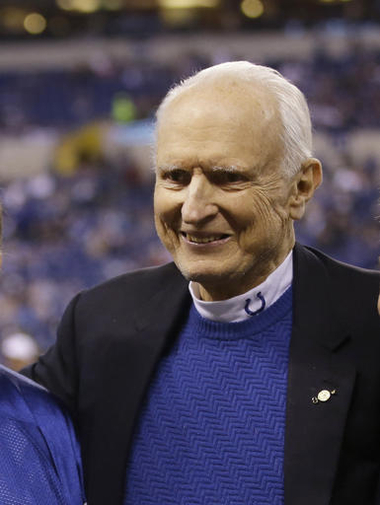Former Indianapolis Mayor William Hudnut dies at 84

INDIANAPOLIS (AP) — William H. Hudnut III, the former Indianapolis mayor credited with revitalizing the city's downtown after years of decline, died early Sunday, according to a family spokesman. He was 84.
Hudnut, the city's longest serving mayor, died in hospice care in Maryland following a lengthy illness, said former aide and family spokesman Dave Arland.
Born in Cincinnati, Ohio, in 1932, Hudnut was a minister at Second Presbyterian Church in Indianapolis before he entered politics, winning one term in Congress in 1972 as a Republican before he was defeated in 1974.
He successfully ran for mayor of Indianapolis in 1975, inheriting a sleepy rust belt city that had been hollowed out amid white suburban flight and the decline of the city's manufacturing base.
In fact, downtown Indianapolis was once so desolate that men armed with shotguns hunted pigeons on Sundays among empty buildings and a trash-strewn river canal. Alluding to the annual Indianapolis 500 car race, author and native son Kurt Vonnegut Jr. described the city in 1970 as a place where "it was no easy thing to be an optimist" and the passage of time was marked by "the 500-mile speedway race, and then 364 days of miniature golf."
Enter Hudnut, who over the course of sixteen years laid the groundwork his predecessors have since built upon, turning Indianapolis into a hub for conventions and sporting-related events.
The city's downtown now boasts hotels, restaurants, theaters, a 3-mile canal walk and boutique apartments. A modern convention center has been built along with an enclosed NFL football stadium and an NBA basketball arena. Construction cranes hover above the city.
"The vision I have for Indianapolis is a city that is both economically competitive and compassionate toward urban and human problems," Hudnut said during his final term in office. "To make the city more livable involves more than just creating beautiful spaces and buildings. It's more than a solid economic foundation and more than good jobs. It's embracing future change. It's dealing with tough human issues that touch the compassionate side in all of us."
Hudnut spearheaded construction of the "Hoosier Dome" football stadium in 1982 with no guarantees that an NFL team would relocate — persuading the Colts to relocate from Baltimore in 1984 after construction was complete. He was mayor when the 1987 Pan American games were lured to the city.
Colts owner Jim Irsay said Sunday that Hudnut was "instrumental" in bringing the team to the city.
"I will always remember the smile on his face when he walked across the floor of the Hoosier Dome to announce the arrival of the Indianapolis Colts to this great city," Irsay said in a statement.
In 2015, Hudnut was one of several former mayors who penned a public letter amid uproar over a religious objections law signed by Gov. Mike Pence. The law created a legal defense for business owners and employees with religious objections to serving or accommodating gay people.
Hudnut and other mayors said the law threatened to undo efforts made since 1967 to "build an inclusive, caring and hospitable city." Pence and lawmakers later approved changes to the law.
David Frick, a former deputy mayor under Hudnut, told the Indianapolis Business Journal that the Republican was inclusive and a "consensus builder" and wasn't afraid to sit down with Democrats and labor unions.
"History will judge him for what he did in bringing the community together to tackle the revitalization of downtown," said Frick, who served as deputy mayor in the late 1970s. "Politicians these days tend to retreat to their core supporters. He was always looking for input from different parts of the community."
Current Indianapolis Mayor Joe Hogsett, a Democrat said Hudnut deserved credit for turning "'India-NO-place' into 'India-SHOW-place.'"
After his final term as mayor, which lasted until the end of 1991, Hudnut relocated to Chicago, and later the Washington, D.C., area. He was elected mayor of the town of Chevy Chase, Maryland, serving from 2004 to 2006.
Hudnut had been in poor health for over a year, receiving treatment for cancer while also suffering from heart failure, said Arland.
A statue of Hudnut sitting on a bench was erected in downtown Indianapolis in 2014.
He is survived by his wife, Beverly, and four children.
_
Copyright 2016 The Gayly - 12/18/2016 @ 2:12 p.m.





